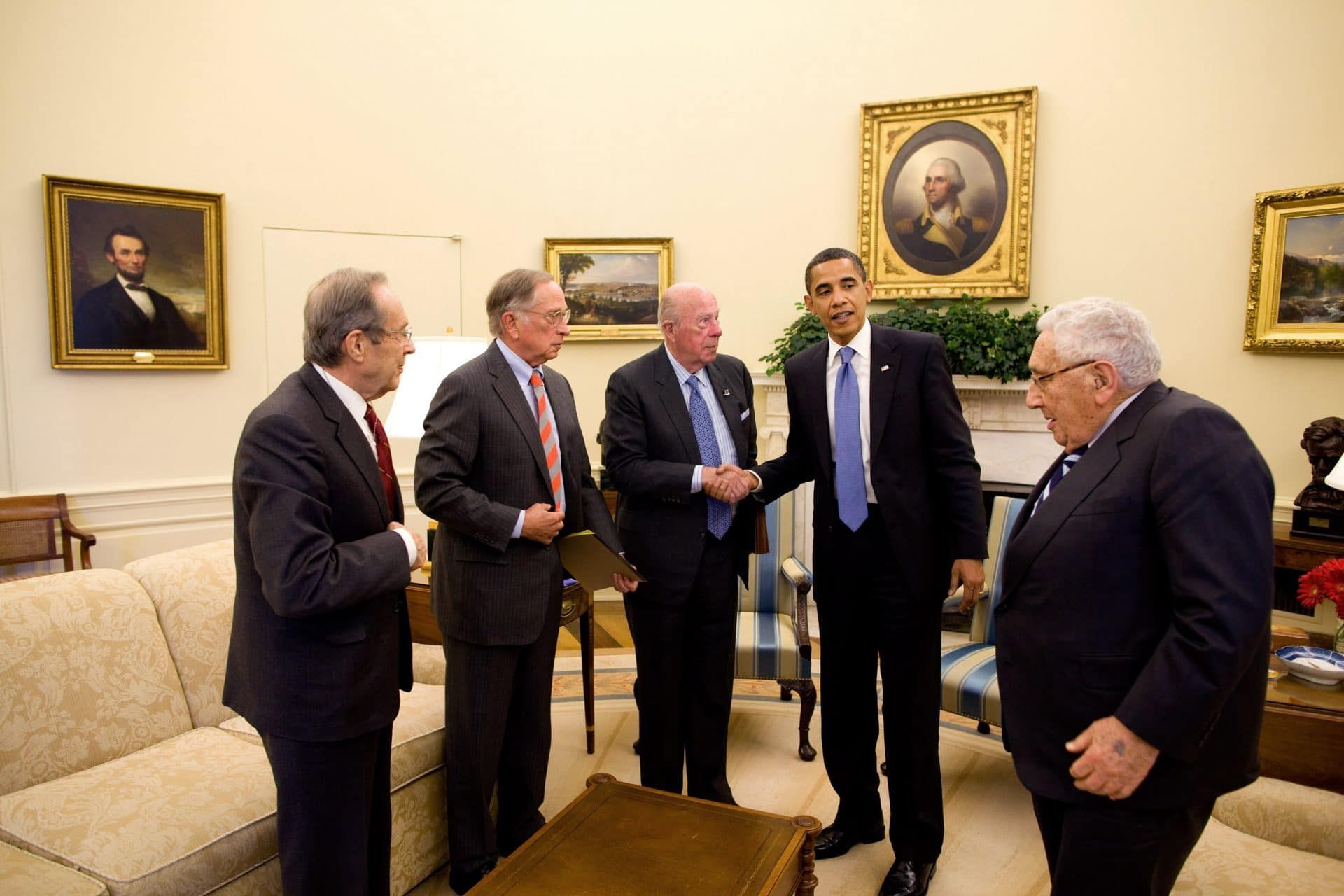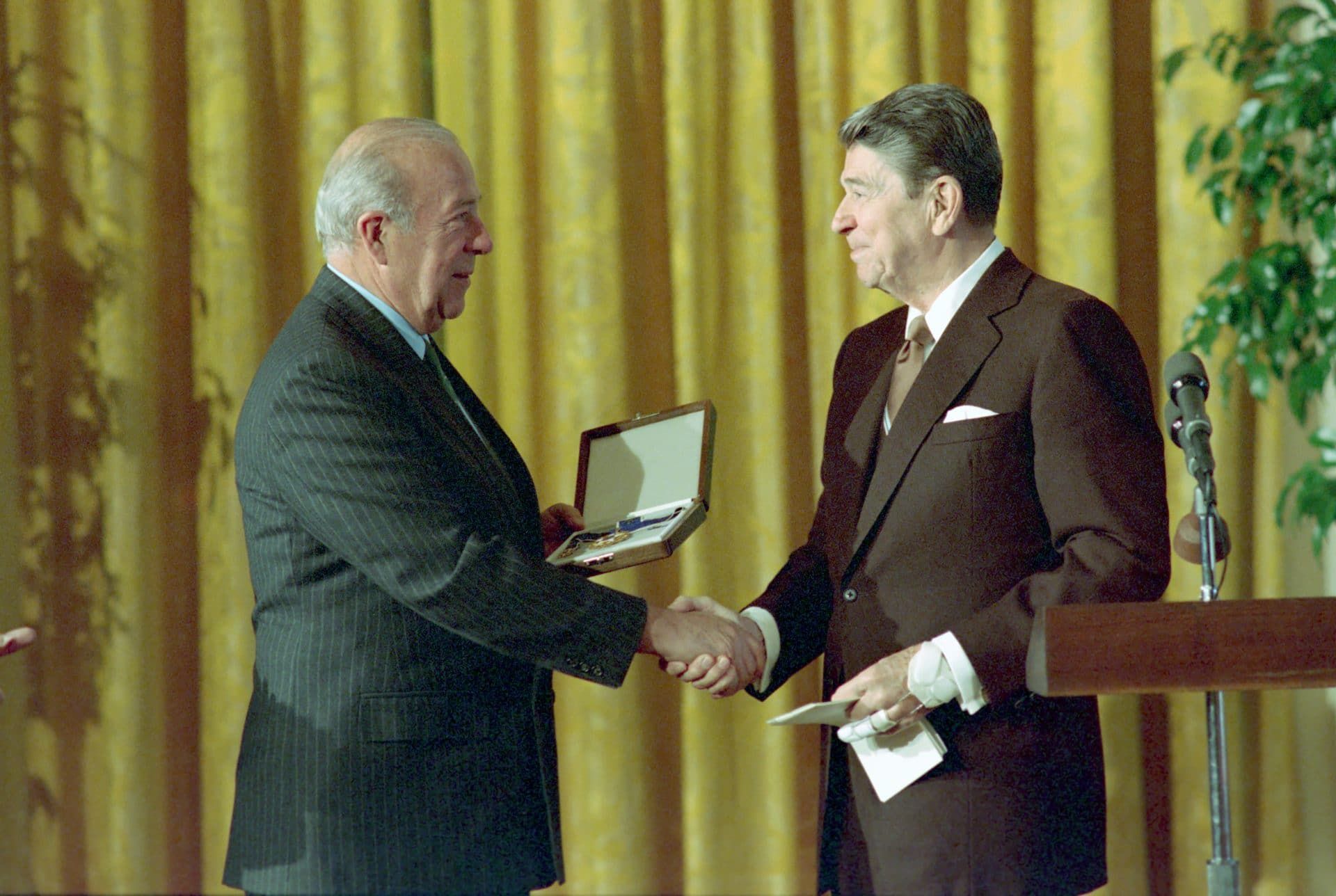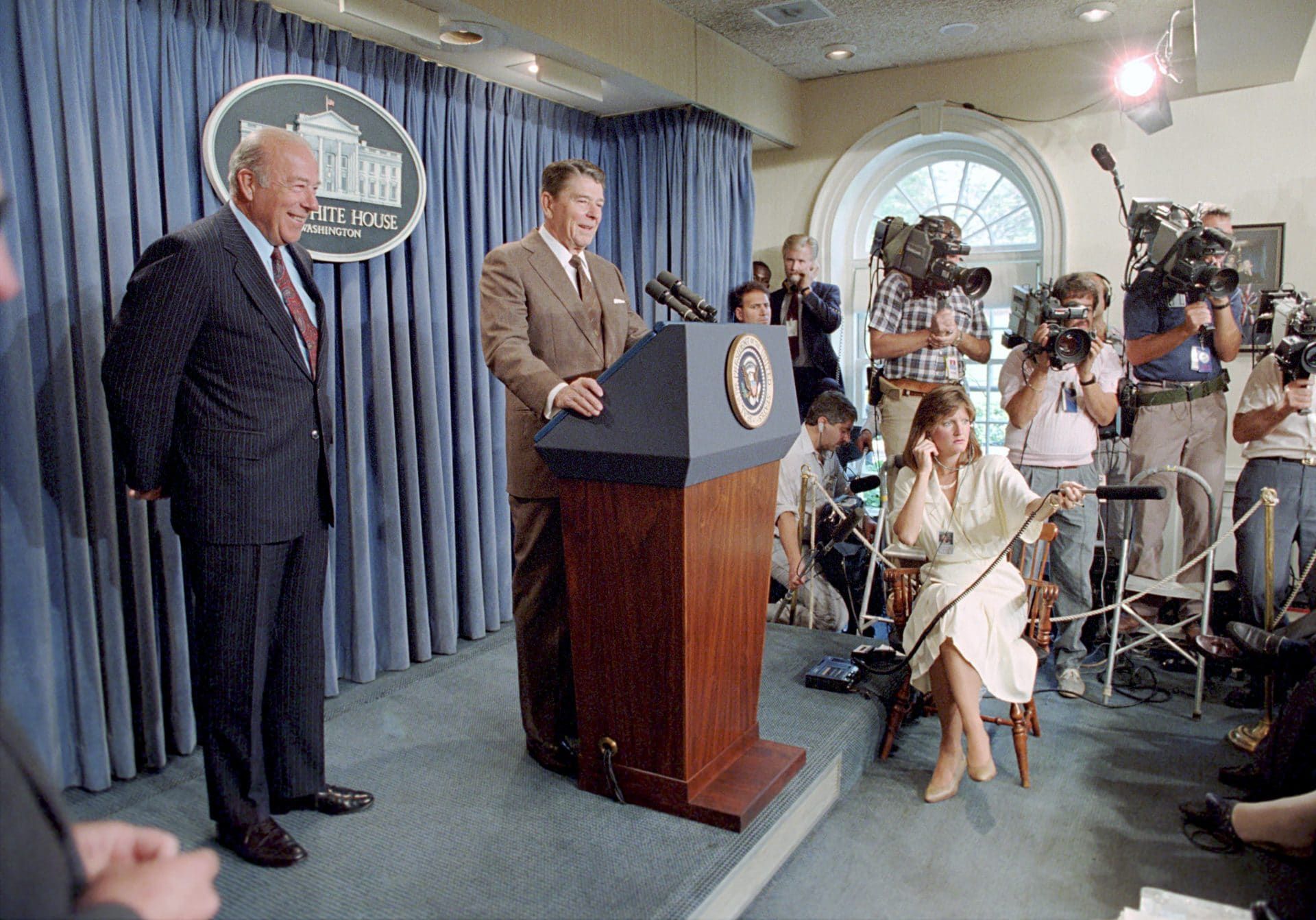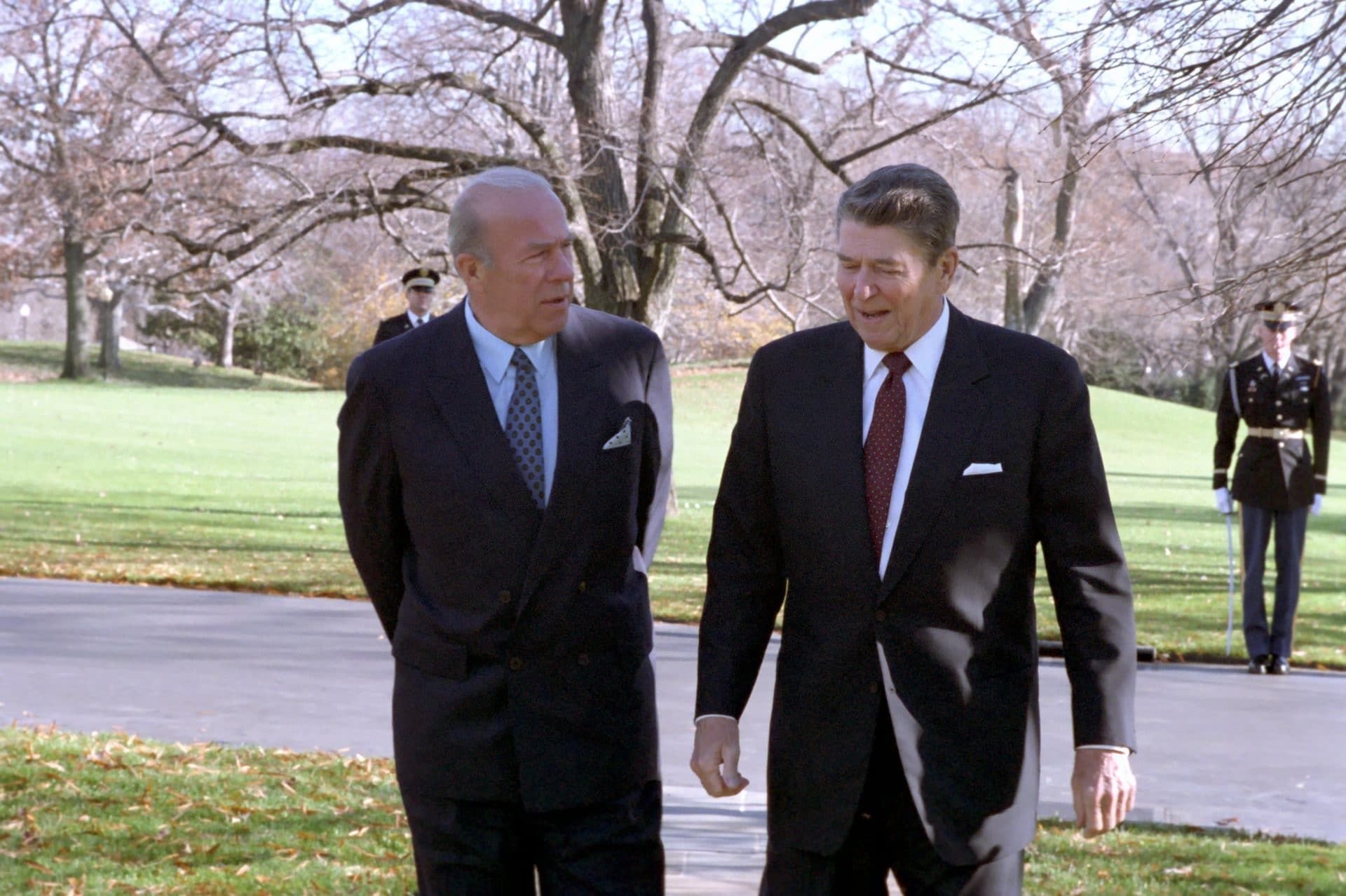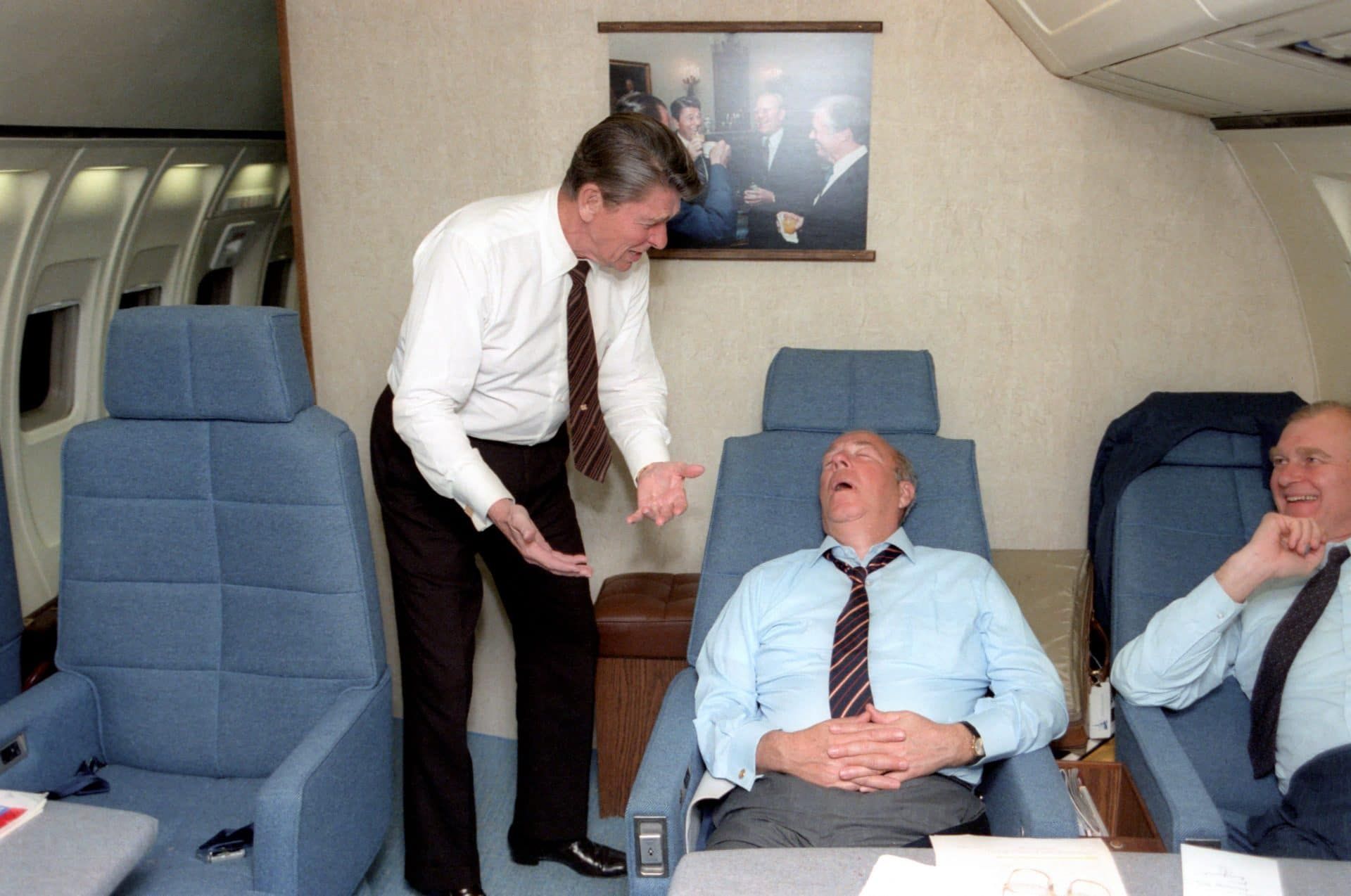An appreciation of George Shultz, a statesman, a gentleman, and a gentle man
By William Tobey | February 8, 2021
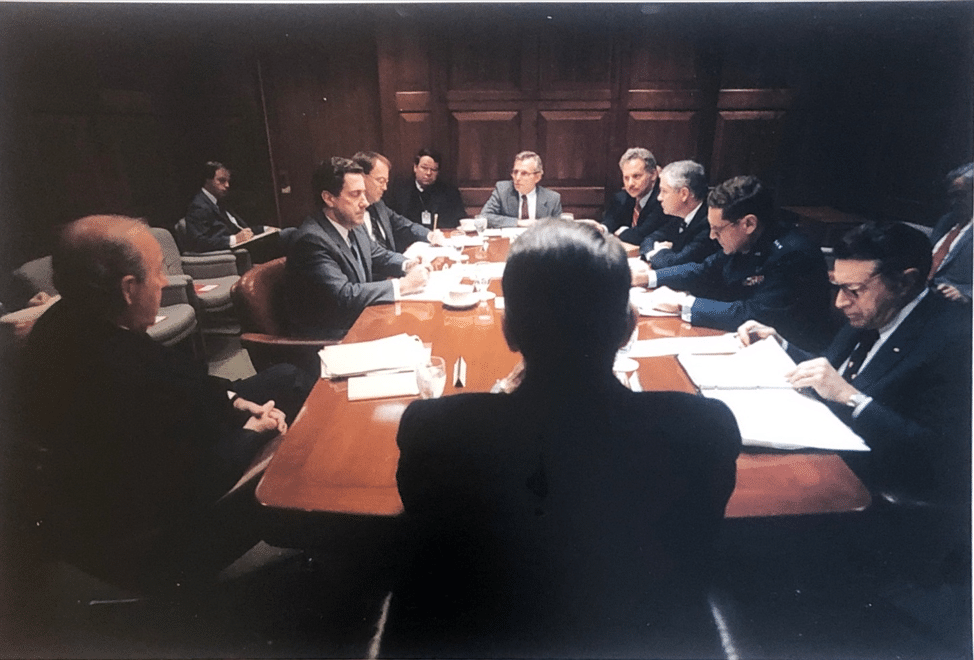 Shultz (front left) and the author (left rear) at a 1987 National Security Council meeting on missile defense and arms control.
Other participants, from left to right: Energy Secretary John Herrington, Science Advisor William Graham, Special Assistant to the President and NSC Senior Director Robert Linhard, National Security Advisor Frank Carlucci, Arms Control and Disarmament Agency Director Kenneth Adelman, CIA Deputy Director Robert Gates, Vice Chairman of the Joint Chiefs of Staff Gen. Robert Herres, and Secretary of Defense Caspar Weinberger. (White House photo.)
Shultz (front left) and the author (left rear) at a 1987 National Security Council meeting on missile defense and arms control.
Other participants, from left to right: Energy Secretary John Herrington, Science Advisor William Graham, Special Assistant to the President and NSC Senior Director Robert Linhard, National Security Advisor Frank Carlucci, Arms Control and Disarmament Agency Director Kenneth Adelman, CIA Deputy Director Robert Gates, Vice Chairman of the Joint Chiefs of Staff Gen. Robert Herres, and Secretary of Defense Caspar Weinberger. (White House photo.)
During the Reagan administration, White House staff would offer after-hours tours of the West Wing to friends and family. One of the stops was the Cabinet Room, where the chairs bear brass plaques denoting the offices held by their owners. As secretary of state, George Shultz sat at President Reagan’s right hand. His chair bore four plaques because of his three previous cabinet posts. (His record four different such offices still stands, matched only by former Attorney General Elliot Richardson.)
That Shultz could succeed in four of the US government’s most difficult and complex jobs is testimony to his enormous competence. More important was his absolute probity. As Treasury Secretary, he stood against Nixon’s efforts to politicize the IRS. Reflecting last December on 100 years of living and learning, he summarized his most important lesson as: “Trust is the coin of the realm.” One of his predecessors as secretary of state and a shrewd judge of public servants, Henry Kissinger, said of him, “If I could choose one American to whom I would entrust the nation’s fate in a crisis, it would be George Shultz.”
For a time, Shultz’s tenure as secretary of state was often defined by his conflict with Defense Secretary Caspar Weinberger. That was unfair to both men. To be sure, their differences over policy toward the Soviet Union and other matters were real. The truth, however, was more nuanced. They both supported the broad swath of Reagan’s foreign policy. They were both hard-nosed opponents of Soviet communism and advocates of American interests. Reagan’s foreign policy would likely have been less successful absent either of them. Together, even in opposition, they helped it to succeed. They presented Reagan with real arguments and options and the arguments deepened the analysis of the options.
Shultz was a Marine officer serving in the Pacific theater during World War II, and it is possible that the atomic detonations at Hiroshima and Nagasaki, and the subsequent Japanese surrender, spared Shultz’s life. Certainly they evoked a lifelong interest in nuclear affairs. Under Shultz’s leadership, the United States and the Soviet Union negotiated the first treaty ever to reduce nuclear arsenals—the Intermediate-range Nuclear Forces Treaty. Shultz recently lamented its demise, calling it “[a] giant mistake.”
In 2007, Shultz joined Henry Kissinger, Sam Nunn, and William Perry in calling for a world free of nuclear weapons, asking, “Will new nuclear nations and the world be as fortunate in the next 50 years as we were during the Cold War?” It is clearly a question of surpassing importance, and the fact that four eminent statesmen raised it adds to its weight. The hard part of eliminating nuclear weapons, of course, is designing the safe and stable way of doing so, in a world of nuclear weapons states clutching their arsenals for what they believe to be very good reasons. Had the four statesmen not raised the issue, however, we would not even be trying to think about the answer.
George Shultz, former secretary of state, was indeed a statesman. He was a gentle man and a gentleman. He was tough on moral weakness. He tended the garden of foreign policy, and harvested its bounty. He embodied the best of American public service.
George Shultz spoke during the Bulletin’s 2016 Doomsday Clock announcement, which was hosted in partnership with the Center for International Security and Cooperation (CISAC) at Stanford University (from The Bulletin of the Atomic Scientists on Vimeo).
Read the Bulletin’s 2013 interview with Schultz here.
Together, we make the world safer.
The Bulletin elevates expert voices above the noise. But as an independent nonprofit organization, our operations depend on the support of readers like you. Help us continue to deliver quality journalism that holds leaders accountable. Your support of our work at any level is important. In return, we promise our coverage will be understandable, influential, vigilant, solution-oriented, and fair-minded. Together we can make a difference.
Keywords: George Shultz, Henry Kissinger, Ronald Reagan, Sam Nunn, William Perry, statesmen
Topics: Nuclear Risk
